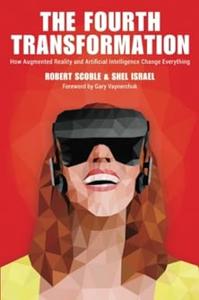
Free Download Robert Scoble, Shel Israel, "The Fourth Transformation: How Augmented Reality & Artificial Intelligence Will Change Everything"
English | 2016 | ISBN: 1539894444 | EPUB | pages: 165 | 0.7 mb
Ten years from today, the center of our digital lives will no longer be the smart phone, but device that looks like ordinary eyeglasses: except those glasses will have settings for virtual and augmented reality. What you really see and what is computer generated will be mixed so tightly together, that we won't really be able to tell what is real and what is illusion.
Instead of touching and sliding on a mobile phone, we will make things happen by moving our eyes or by brainwaves. When we talk with someone or play an online game, we will see that person in the same room with us. We will be able to touch and feel her or him through haptic technology.
We won't need to search online with words, because there will be a new Visual Web 100 times larger than the current Internet, and we will find things by images, buy things by brands, or just by looking at a logo on the jacket of a passerby. Language will be irrelevant, and a merchant in a developing world will have access to global markets.
Medical devices will cure schizophrenia, allow quadriplegics to walk. People will be able to touch and feel objects and other people who are not actually there for conversations, games and perhaps intimate experiences.
From kindergarten to on-the-job, learning will become experiential. Children will visit great battlefields and tour historic places in VR rather than read about them in text books. Med students and surgeons will learn and practice on virtual humans rather than cadavers; oil rig workers will understand how to handle emergencies, before the ever leave the home office.
The Fourth Transformation is based on two years of research and about 400 interviews with technologists and business decision makers. It explains the technology and product landscape on a level designed to be interesting and useful to business thinkers and general audiences. Mostly it talks about how VR and AR are already being used, or will be used in the next one-to-three years.
